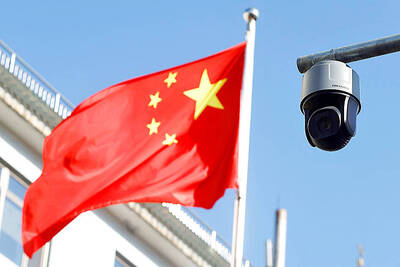In an interview published in the Indian quarterly India and Global Affairs yesterday, President Ma Ying-jeou (馬英九) said he hoped that a cross-strait peace accord could be reached during his term in office.
Ma said there was no timetable in setting up a mechanism for mutual military trust or signing a peace agreement between China and Taiwan. He said that weekend chartered flight services and allowing more Chinese tourists were his administration’s priorities and were accomplished in July. The next step was the push for direct air and sea links, normalization of cross-strait economic relations, and then international participation and a peace agreement, he said.
Negotiating solutions to these issues could not be achieved in the short term, but Ma said he was willing to do his best and hoped to accomplish them during his term.
Ma made the remarks in response to a question asked by the magazine as to whether he would see the more than 1,000 Chinese missiles aimed at Taiwan removed during his presidency.
The interview was conducted in written form in August.
The Presidential Office said yesterday that Ma was stressing that he wanted to achieve these goals during his term in office, but that it was not a formal promise or statement.
In the interview, when asked if the failure to pass the referendums on the UN and constitutional amendments meant that Taiwan would give up these efforts, Ma said it only meant that the Taiwanese people still had different opinions on the name and method to be used for a UN membership bid.

POLAM KOPITIAM CASE: Of the two people still in hospital, one has undergone a liver transplant and is improving, while the other is being evaluated for a liver transplant A fourth person has died from bongkrek acid poisoning linked to the Polam Kopitiam (寶林茶室) restaurant in Taipei’s Far Eastern Sogo Xinyi A13 Department Store, the Ministry of Health and Welfare said yesterday, as two other people remain seriously ill in hospital. The first death was reported on March 24. The man had been 39 years old and had eaten at the restaurant on March 22. As more cases of suspected food poisoning involving people who had eaten at the restaurant were reported by hospitals on March 26, the ministry and the Taipei Department of Health launched an investigation. The Food and

The long-awaited Taichung aquarium is expected to open next year after more than a decade of development. The building in Cingshui District (清水) is to feature a large ocean aquarium on the first floor, coral display area on the second floor, a jellyfish tank and Dajia River (大甲溪) basin display on the third, a river estuary display and restaurant on the fourth, and a cafe and garden on the fifth. As it is near Wuci Fishing Port (梧棲漁港), many are expecting the opening of the aquarium to bring more tourism to the harbor. Speaking at the city council on Monday, Taichung City Councilor

A fourth person has died in a food poisoning outbreak linked to the Xinyi (信義) branch of Malaysian restaurant chain Polam Kopitiam (寶林茶室) in Taipei, Deputy Minister of Health and Welfare Victor Wang (王必勝) said on Monday. It was the second fatality in three days, after another was announced on Saturday. The 40-year-old woman experienced multiple organ failure in the early hours on Monday, and the family decided not to undergo emergency resuscitation, Wang said. She initially showed signs of improvement after seeking medical treatment for nausea, vomiting and diarrhea, but her condition worsened due to an infection, he said. Two others who

Taiwanese should be mindful when visiting China, as Beijing in July is likely to tighten the implementation of policies on national security following the introduction of two regulations, a researcher said on Saturday. China on Friday unveiled the regulations governing the law enforcement and judicial activities of national security agencies. They would help crack down on “illegal” and “criminal” activities that Beijing considers to be endangering national security, according to reports by China’s state media. The definition of what constitutes a national security threat in China is vague, Taiwan Thinktank researcher Wu Se-chih (吳瑟致) said. The two procedural regulations are to provide Chinese